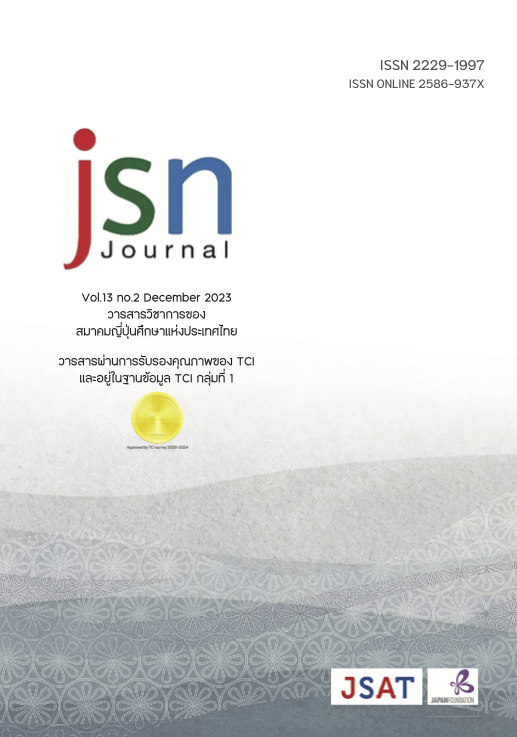Expectations Regarding the Daughter in the Short Story "Juusanya"
Main Article Content
Abstract
Higuchi Ichiyo is Japan's first female professional writer and has been considered a headstrong anti-patriarchal writer. On the other hand, research on her biography reveals that Ichiyo had to perform the traditional role of a daughter all her life. This article studies Higuchi Ichiyo's famous literary work “Juusanya” (十三夜) to explore the theme of parents' expectations toward daughters and the role of the daughter characters in Higuchi ichiyo’s literature, including the relationship between women and patriarchal society. The study found that the daughter characters are commonly expected to get married. Despite the daughters’ resistance, the stories often end with their unsuccessful struggles to break away from the patriarchal norms because of gratitude. The writings also show that these traditions were ingrained in the daughters’ families themselves and that the women are forced to live up to the misogynistic standards. This reveals the status of women during the Meiji period.
Article Details

This work is licensed under a Creative Commons Attribution-NonCommercial-NoDerivatives 4.0 International License.
ข้อความและข้อคิดเห็นต่างๆ ในบทความเป็นของผู้เขียนบทความนั้นๆ ไม่ใช่ความเห็นของกองบรรณาธิการหรือของวารสาร jsn Journal
References
เดือนเต็ม กฤษดาธานนท์. (2558). นวนิยายญี่ปุ่นสมัยใหม่. กรุงเทพมหานคร: สำนักพิมพ์แห่งจุฬาลงกรณ์มหาวิทยาลัย.
ปิยะนุช วิริเยนะวัตร์. (2549). ภาพผู้หญิงญี่ปุ่นที่สะท้อนในงานเขียนสมัยเมจิ. วารสารศิลปศาสตร์ มหาวิทยาลัย ธรรมศาสตร์, 6(1), 196-228.
ปิยะนุช วิริเยนะวัตร์, สุณีย์รัตน์ เนียรเจริญสุข. (2552). การศึกษามุมมองทางวัฒนธรรมที่แตกต่างผ่านการใช้คำว่า “ยักษ์”: กรณีศึกษาเรื่องจูซังยะของฮิงูจิ อิจิโย. Journal of Language and Culture, 38(1), 135-153.
วิวันพร กิจไกรลาศ. (2552). ตัวละครหญิงในวรรณกรรมของฮิงุชิ อิชิโยกับผู้หญิงในยุคเมจิ. (วิทยานิพนธ์อักษรศาสตร์มหาบัณฑิต). จุฬาลงกรณ์มหาวิทยาลัย, กรุงเทพมหานคร.
PATESSIO, M. (2011). Women and Public Life in Early Meiji Japan: The Development of the Feminist Movement. University of Michigan Press. https://doi.org/10.3998/mpub.9340032
折井美耶子(1992). 「時代を見る―近代」総合女性史研究会(編),『日本女性の歴史性・愛・家族』.東京 : 株式会社角川学芸出版.
乾順子(2014).「既婚男性からみた夫婦の家事分担: 家父長制・資本制概念と計量研究の接合」『大阪大学大学院人間科学研究科紀要』 40,93-110.
植村邦正(1981).「樋口一葉入門 (一)」『名古屋女子大学紀要』27, 223-233.
植村邦正(1982).「樋口一葉入門 (二)」『名古屋女子大学紀要』28, 277-285.
植村邦正(1983).「樋口一葉入門 (三)」『名古屋女子大学紀要』29, 243-250.
菅聡子(1992).「明治の東京―樋口一葉の小説を視座として―」お茶の水女子大学「魅力ある大学院教育」イニシアティブ人社系事務局(編),『「対話と深化」の次世代女性リーダーの育成 :「魅力ある大学院教育」イニシアティブ 平成17年度活動報告書 : シンポジウム編』(26-31).東京: お茶の水女子大学「魅力ある大学院教育」イニシアティブ人社系事務局.
金多希(2011).「東アジアの近代と女性, そして 「悪女」」宇都宮大学国際学部(編),『宇都宮大学国際学部研究論集』(67-81).栃木 : 宇都宮大学国際学部.
阪井裕一郎(2013).『家族主義と個人主義の歴史社会学: 近代日本における結婚観の変遷と民主化のゆくえ』慶應義塾大学大学院社会学研究科2013年度博士学位論文.
佐々木秀美(2019).「女性の権利 (Woman's Right) 運動にナイチンゲールが果たした役割とわが国における女性の権利運動の展開」『看護学統合研究』20(2),25‐43.
塩谷昌弘(2009).「< 書評> 仙波千枝著 『良妻賢母の世界近代日本女性史』」北海学園大学大学院文学研究科(編), 『年報新人文学』(188-192). 北海道 : 北海学園大学大学院文学研究科.
総合女性史研究会(1992). 『日本女性の歴史性・愛・家族』東京 : 株式会社角川学芸出版.
趙恵淑(2006).「樋口一葉やみ夜論」『日本學硏究』19, 281-302.
西荘保(1996).「『十三夜』 論: 先行する 「嫁した女の不幸」の話と比較して」『日本文学』45(2),19-28.
平井裕香(2015).「「此身一つ」 のゆくえ―樋口一葉 「十三夜」 における身分と身体―」『言語情報科学』13,157-174.
山﨑信子(2007).「近代日本における 「家庭教育」:明治期にみられる「主婦」の位置づけの変遷」『創価大学大学院紀要= The bulletin of the Graduate School, Soka University』28,173-192.


